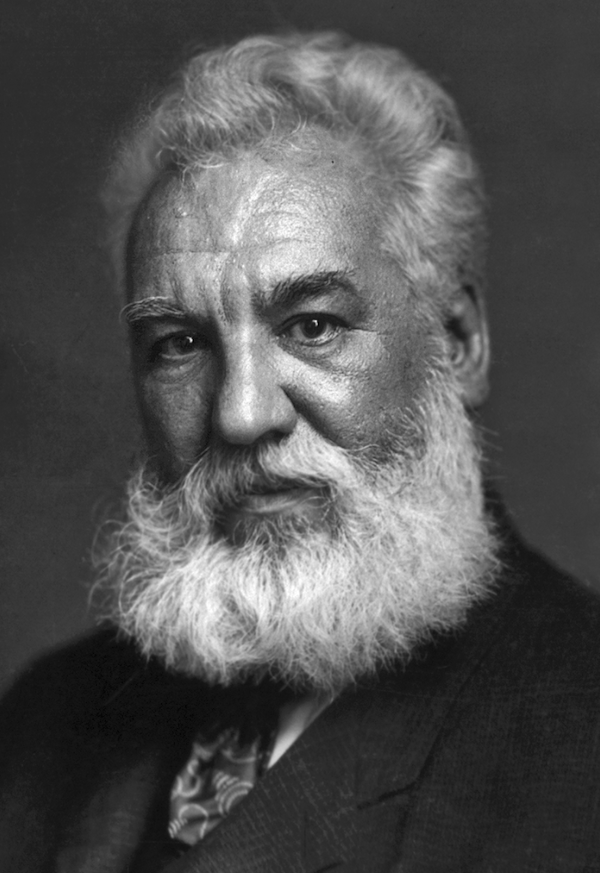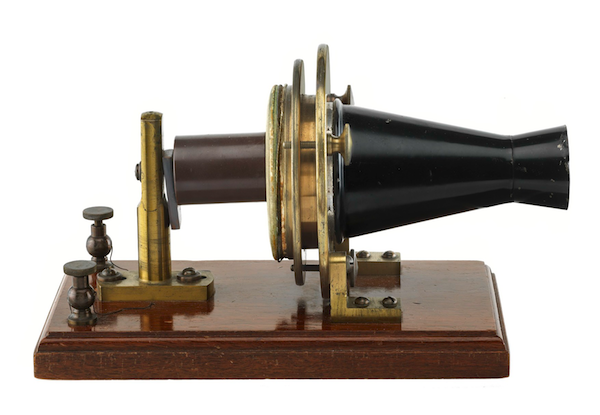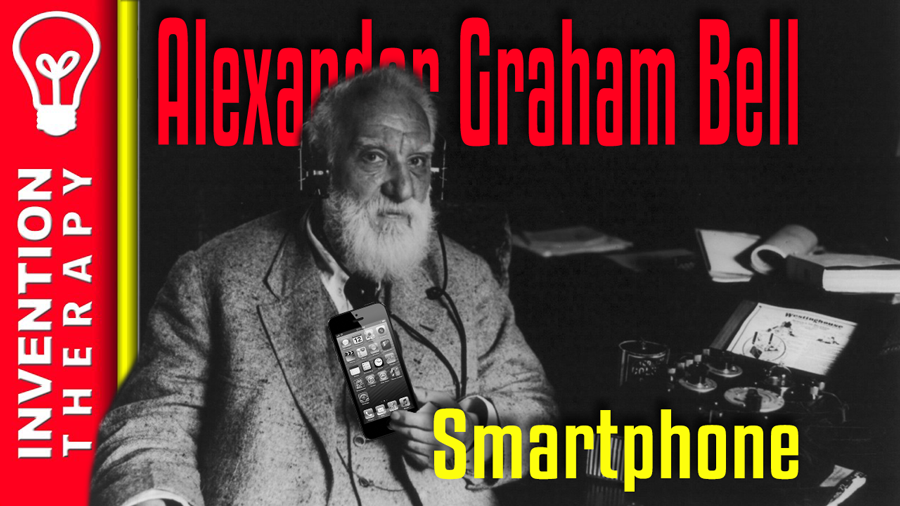Alexander Graham Bell is known as the man who invented the telephone in 1876. He was a visionary who changed the way people communicated. Bell contributed significantly to how the world is today. His groundbreaking invention enabled people from all over the world to talk over long distances via wires with his small gadget. The road from Bell’s telephone to the smartphones of today was long, but it was the telephone invention that enabled us to enjoy the technology we have now.
Bell spent most of his life studying the art of speech and public speaking. Active in this field from his early childhood, the Scotsman stemmed from a family primarily involved in the study of both verbal and visual communication. With the help of his father, grandfather, and his two brothers, Alexander Graham Bell, worked at improving the way people express themselves and communicate at an early age. He took a great interest in the matter and started experimenting very early on in his life.
His life was full of tragedy and difficulties, both on a personal and professional level. In his own life, he was annoyed by problems such as facing his brothers’ deaths and trying to communicate with his deaf mother and grandmother. On a professional level, Bell was subject to dozens of court cases regarding his telephone invention.
Bell’s achievements still stand today and bear an influence on our world. In this article, we will take a look at Alexander Graham Bell’s life and his invention of the telephone.

Quickfire Facts About Alexander Graham Bell
Date and Place of Birth: March 3rd, 1847, Edinburgh, Scotland
Death: August 2nd, 1922, Nova Scotia, Canada
Famous For: Invention of the telephone, improving communication, the invention of a photophone, the invention of an early metal detector
Spouse: Mabel Hubbard, married in 1877
Children: four: two sons died in infancy; his daughters were Elsie May Bell and Marian Hubbard Bell.
Education: Educated by father, the Royal High School of Edinburgh, University of Edinburgh, and University College London.
Other Interesting Facts: Alexander Bell added his middle name when he was 10, after one of his family friends, Alexander Graham.
The Life of A Visionary
The innovator was born on March 3rd in 1847 in Edinburgh, Scotland. The Bell family lived in a small house on South Charlotte Street. Alexander had an older brother, Melville, and a younger one who was born in 1848 – Edward. Alexander’s grandfather and grandmother were also heavily involved during his childhood. Alexander’s father (Alexander Melville) and grandfather were both elocutionists – experts in speech. Alexander got involved in the art of communicating from his first days of life.
Even as a child of 11, Alexander started doing some experiments with his brothers and friend, Ben Herdman. Alexander was interested in his mother’s deafness and took a lot of effort to communicate with her. When he was just a child, he learned how to communicate with his mother using gestures, and later tried to communicate with her by talking directly to her forehead. This strategy enabled her to hear her son’s voice better. He often indulged in various exciting projects as a kid, such as recreating sounds of other people, ventriloquism, and other voice tricks. His stunts were famous at family gatherings.
Bell’s father and grandfather taught Alexander and his brothers a lot about sound. His father taught him to write and understand visible speech, which enabled him to communicate with deaf-mutes. His father also wrote one hundred and eighty-six editions of a journal named The Standard Elocutionist. In it, he debated and presented various speech methods and analyzed communication with deaf people.
Bell Took Little Interest in Learning Initially
In his childhood, Bell completed no formal education. Instead, he was taught at home by his father. It was clear that he was a talented kid, but took little interest in learning at the start. He was enrolled in the Royal High School in Edinburgh at an early age, but his results were disappointing. It was, most likely, due to a lack of interest and his preference in performing experiments. He never seemed to be able to complete any type of formal schooling.
His willingness to learn came to the forefront only when Alexander moved to London to live with his grandfather, Alexander Bell. He instilled a hard-working mentality into his grandson and taught him many valuable lessons in both speech and elocution. Alexander studied elocution thoroughly and would start to learn how to pronounce words more clearly. Soon, he was able to give lectures at a very young age at a school in Elgin, Scotland. With this funding from his tutorship, the Scotsman was able to enroll in the University of Edinburgh. Later, he entered the University College of London.
Early Experiments
At the age of 18, Bell was intrigued by a talking head, an experiment by a Hungarian scientist named Wolfgang von Kempelen. This talking head, or an automaton, was capable of producing speech-like sounds with the help of an operator, and it sounded like a baby’s first words. At the time, many people found this fascinating, and Bell was keen to do it on his own.
He set out to work on it with his brother, Melville. Their father offered them a big prize, should they succeed with the project. The boys were motivated to create something that would entertain the streets where the Bells lived. Soon, Melville and Alexander created a talking head that was capable of saying the word “Mama.” Later, they made a talking head of a terrier that appeared to mutter the words, “How are you, grandma?”. Unsurprisingly, these inventions gathered a lot of interest in the local community, and many people came to their home to see it.
Bell thought he was onto something, and that he achieved a feat that hasn’t yet been reached by anyone. But it turned out that was not the case after he contacted a close friend of his father, who was a reputable philologist at the time, about it.
In 1865, Bell continued experiments on his own. He was experimenting with sound and often used the telegraph. He was keen to produce and transfer tones with the use of electricity. He was mainly involved in school lecturing in Elgin and conducted experiments in his spare time.
Tragedy and Move to Canada
We could call the years between 1865 and 1870 the tragic years for Bell. This time shaped Alexander’s personal life and left scars on his mind forever. These events influenced his work and inventions in the wrong way, and these were the years when he wasn’t as prolific as later in his life.
During the years 1865, 1866, and 1867, Bell was very busy with his work on elocution. He was becoming an essential part of the family business. He continued carrying out his experiments with electrically produced sounds, while also working as an instructor in Bath, England. He was affected by the workload, as he was often too exhausted to be productive. But it was his brother, Edward, that fell seriously ill in 1867. In that same year, Alexander’s brother died of tuberculosis.
Edward’s death was a massive blow for the family. Alexander visited North America somewhere during that time, and his father saw a better living standard in Canada than back in the UK. Alexander disagreed at first and proceeded with his work in Bath and experiments. But soon, he moved back to his father’s home to help him due to Melville moving out and getting married. Melville, his older brother, also opened his own business that was thriving. In 1870, however, another tragedy struck the Bell family. Melville died due to tuberculosis, a disease that took two sons away from the Bell family. Alexander was the only son left.
After Melville’s death, Alexander was starting to consider the option of moving to Canada seriously. At the time, he was also sickly, and his parents were reluctant, but they decided to close the company in London and move to Ontario. There, a new chapter awaited Alexander Graham Bell and his family. At the age of 23, Alexander moved to Canada.
Bell’s Work on the Telephone
In Ontario, the family bought a farm outside the town of Brantford. This farm still stands today as a memorial to Bell. Alexander set up a workshop where he would be able to concentrate on his experiments with sound and speech. It was in this workshop that something special was beginning to happen.
Work With the Deaf
During 1870 and 1871, Bell was experimenting with speech. He started to focus on something beneficial for the world, as his father encouraged him to do. Bell worked with the deaf-mutes and tried to improve their lives by teaching them the visible speech method that he and his father worked on for many years. This work proved highly successful, and some clients saw significant improvements in speech. At this time, his father got a chance to become a professor in Boston. There, but he sent his son instead.
Soon, Bell established a school for the deaf in Boston. His first classes consisted of 30 deaf people, but the popularity grew from there. Soon, he had an entire school devoted to helping people communicate.

The Harmonic Telegraph
In Boston, Bell was fascinated by the idea of transmitting voice with the help of an electrical current. Bell started working on a harmonic telegraph. The sound transferred at different frequencies, and the device would act as a sound telegraph that would help people transfer words much faster and efficiently. There would be a voice telegraph on the sending side, and wires connected the receiving end. Bell started working on this idea in 1871 already but doubled his efforts from 1873 on. He had the first design of the telephone, albeit straightforward and unsophisticated.
In 1874, Bell became aware of work conducted by Meucci, an Italian inventor who was already working on a similar device to Bell. His design was much more advanced and already applied for a pattern. But Meucci got turned down, and Bell studied his patent thoroughly. He implemented some ideas from there. But Bell made many improvements on the harmonic telegraph on his own.
Finally, in 1874, he seemed to have made it work well enough to present his idea to Joseph Henry, the head of the Smithsonian Institute (an institution that helped innovators develop their concepts in the 19th century). Henry, himself being an inventor, was intrigued by the idea. Henry encouraged Bell to carry on with the project, but Bell thought he lacked the necessary knowledge and skills to complete it. Henry replied: “Get it (get the knowledge).” Since then, Bell worked day and night on his new project, changing things and trying new experiments. But by 1875, his efforts started to dwindle until Henry introduced Bell to Thomas Watson.
Watson was a highly skilled engineer and electrician. He was hired by Bell to help him complete the project. But the project still lacked financial backing. With Henry’s help again, the funding was to be provided by Sanders and Hubbard, who saw plenty of potential in the new telegraph. In 1875 came the breakthrough. Through an accident, Watson heard the voice of Bell transmitted through the line; it was still very indistinct, but the pair would work on that later. For now, they had invented the first working telephone.
Patent and Legal Troubles
Bell was sure that this was the breakthrough of the telephone and started with demonstrations of the new invention. People were amazed by it, and in 1876, Bell applied for the patent.
But he had many competitors at the time. One of the most notable competitors was Elisha Gray, who filed a patent on the same day as Bell. On March 7th, in 1876, Bell took out the license. It was the most significant moment of his life and would make him known worldwide for his invention of the telephone.
More than five hundred lawsuits followed. Some claimed the unoriginality of the telephone invention, while there were also claims that others did it first. Nonetheless, it was Bell’s patent that triumphed, and therefore we know him today as the inventor of the telephone.
Bell’s Legacy
Bell’s telephone is the great grandfather of modern smartphones. It was a natural precursor that launched the industry into some of the biggest industries in the world. This invention from 1876 gradually changed the world from how it communicated, how it behaved, and how it worked.
It is one of the most influential designs of all-time with enormous implications on the planet. It is a staple of the modern world, a technology without which we can’t dare to imagine.
Bell had a genuine interest in improving life for everyone. First, he worked with the deaf and strived to make the world better for them. He then changed the world for all of us with the invention of the telephone.
His whole life is a lesson for us all. He dealt with pressures in both his professional and personal life. No matter the challenges, Bell always found a way forward, and so can you.

Are you ready to become an inventor?
Getting your idea out of your head and into your hands is only the first in a long set of steps towards becoming a successful inventor.

First Steps To A Successful Invention
At Invention Therapy, we believe that the power of the internet makes it easier than you think to turn your invention idea into a reality. In most cases, you can build a prototype and start manufacturing a product on your own. Changing your way of thinking can be difficult. Being an inventor requires you to balance your passion with the reality of having to sell your products for a profit. After all, if we can't make a profit, we won't be able to keep the lights on and continue to invent more amazing things!Please subscribe to our Youtube Channel!




